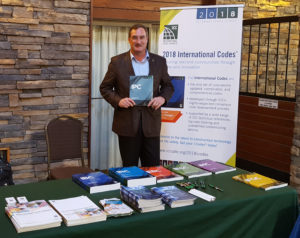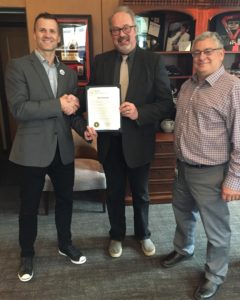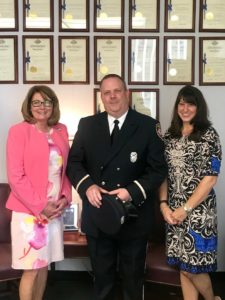
ICC Government Relations: State, local and federal update
This year, the International Code Council’s Government Relations team has been tracking 958 bills in 44 states, the District of Columbia and the United States Congress. This article is the first in a three-part series to provide a brief sampling of what the Government Relations team does in state capitals across the nation every year.

It gets repeated a lot among the International Code Council’s Government Relations team: “It’s all about relationships.” And nobody takes that more to heart than Seattle’s Kraig Stevenson, senior regional manager of Government Relations, who has worked on building code issues in state capitals for nearly 20 years.
You’ll find him perched outside a legislator’s office in Olympia, Wash., from the first gavel to “signe die” to “have a word” on a bill he’s helping to draft or one he’s trying to pass or defeat. If the legislator is not available, he’s working over the staff to make a point or to get an appointment. Between sessions, he’ll stay in touch with key legislators over coffee or at an event. Any opportunity — small or large — is an opportunity to make a point, to leave an impression or become a trusted resource.
“My focus is what is in the mind of the legislator to find out what their opinion of public safety is and to see how I can help them develop good policy,” said Stevenson. “I’ve found that the more they get to know us, the more they want to work with us and trust us.”
In nearly two decades, he’s become a go-to resource for advice and institutional memory for legislators in both political parties, not only in Washington but also the other states in region: Montana, Idaho, Alaska and Hawaii.
His efforts this year are zeroed in on three bills in Olympia. One bill that passed, HB 1444, adopts the ANSI/APSP/ICC-14 2014 Standard for portable electric spas, which equalizes the ability of product listing entities, like ICC Evaluation Service, to compete in the delivery of their product listing services. Another bill that passed, HB 1486, created mandatory certification for all inspectors in the state by requiring third-party inspection agencies to use ICC-certified inspectors.
The job is not all about passing bills. Many times, killing bills requires equal tenacity. Such was the case for Washington’s SB 5634, which would require a five-year state code adoption cycle. It failed to get out of its committee hearing.
The three-year code adoption cycle has been challenged in several states. For Stephen Jones, Government Relations regional manager and former Code Council Board president, it has been a reoccurring issue in the South Carolina General Assembly that started before taking the job with Government Relations. Jones is also assigned to North Carolina, Tennessee and New Jersey.
“There has been an on-going discussion between the builders, the Building Code Council and the code officials,” said Jones. “The first version of the bill had a flat five-year adoption cycle. The second version of the bill had a three-year adoption period for the International Building Code and a six-year adoption for the International Residential Code from the adoption period of the South Carolina Residential Code.”
Working with a coalition plus the state municipal association, Jones helped the bill retain the three-year adoption cycle. However, the new form of the bill won’t meet its deadline for passage this year. Jones and the coalition will have to pick it up next year.
“In order to move it forward, I had to draw out a timeline showing how a delay in adoption could actually put the state on a seven and a half-year cycle,” Jones said. “This would have jeopardized their DRRA (Disaster Recovery Reform Act) standing, FEMA funding and ISO ratings.”
Upsetting the three-year code cycle takes many forms. A bill in South Carolina would arbitrarily require a fiscal impact statement on every code, ordinance or regulation that would affect residential construction.

Another attempt to delay the code updating process is before the Minnesota State Legislature. This proposal would add a new layer of government involvement in the code updating process, creating a much more cumbersome process in a state that already restricts code updates to every six years. The proposal would force intervention by the legislature if updating all of the state codes could possibly increase the cost of an average house construction by $1,000. Considering the cost of an average house in Minnesota is more than $310,000 and the state code cycle is six years, the $1,000 figure represents less than one-third of one percent of the average cost to build a new home.
A coalition of 17 organizations led by the Association of Minnesota Building Officials has been working to stop the $1,000-limit proposal for the third consecutive year. Backers of the bill claim it would help ease the housing crisis in the Minneapolis–St. Paul metro region, but they can’t produce evidence that the bill would save substantial money on construction. The Minnesota Department of Labor & Industry, which manages the state building codes, strongly opposes it.

The work of Dottie Harris, vice president of State & Local Government Relations, with the New York State Legislature seeks to uphold the three-year code adoption cycle with a bill, NY–A4460, that directs the state fire prevention and building code council to update the state’s model codes within 12 months of the publication of each update. She was instrumental in getting the New York City building codes to update to the 2015 level. This would keep the state and New York City closer in sync with each other.
Bill Nash, regional manager in Maine, Vermont, New Hampshire, Connecticut and Rhode Island, has been successfully building a coalition, including state Code Council members, to prevent an erosion of life safety codes in Maine and to move the administration of the Maine Uniform Building and Energy Code back to the state Department of Public Safety and to provide funding for three full-time positions to effectively administer the codes.
In New Hampshire, Nash and a coalition helped turn around an attempt to block the consideration of updating the state codes to the 2015 level that started last year. In the interim, Nash and other stakeholders have successfully made the case that the code updates are a positive move for the state and are on the path to passing HB 562 to create the updates and include the adoption of the International Swimming Pool and Spa Code.
Part two in next week’s Building Safety Journal takes you to state capitals in Texas, Illinois and the western states. Part three focuses on how ICC Government Relations has cultivated relationships with like-minded associations and stakeholders across the United States to increase effectiveness with decision makers in legislatures and local jurisdictions.







